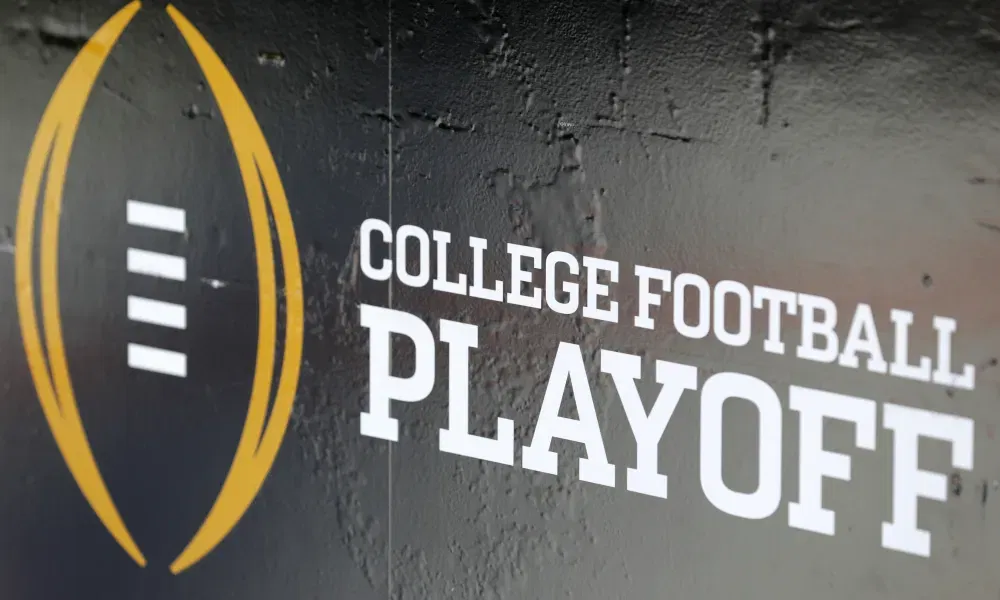

With the December 1, 2025, deadline inching closer, the debate over the future College Football Playoff format is heating up across top conferences. One particular format is quickly gaining traction as the most logical path forward. And now, amid the Big 12’s $100 million partnership with PayPal, a top official from the conference has reaffirmed his full-throated support for the structure, while popular sentiment seems to be going in its favor as well.
Watch What’s Trending Now!
That official is Big 12 Commissioner Brett Yormark, who has made no secret of his preference for a merit-based postseason of 16 teams. Fresh off announcing a groundbreaking financial partnership, Yormark doubled down on his support for the 5+11 model: five automatic qualifying bids for top conference champions and 11 at-large selections based on ranking. The top official felt that it’s about fairness, access, and believing in the Big 12’s growth.
“Well, I like 16, I’ve been pretty vocal about it. I think more access is good, but then there’s a point in time where access could create dilution,” Yormark said on Big 12 Radio. “I don’t think 16 does that. As I said during our spring business meetings, after talking with our coaches and ADs, 5+11 was what I liked. Candidly, it’s not ideal for us today, but I’m betting on the Big 12… I’m betting on the fact that settlement creates, in theory, a level playing field. Okay, when everyone can only spend up to the cap, you can’t circumvent it, and if you try, there’ll be rules. Okay, they are going to be punitive if you break those rules, so in theory it should create a level playing field settlement.”
ADVERTISEMENT
Commissioner Brett Yormark and @PayPal CEO Alex Chriss sat down with @SquawkCNBC earlier today to discuss the details of a historic partnership that will bring PayPal and Venmo to each college campus in the Big 12 Conference. pic.twitter.com/f0i4PtQQp9
— Big 12 Conference (@Big12Conference) June 26, 2025
Few may wonder: Why is he so high on 5+11? That’s because, in his own words, he sees it as a format that rewards on-field success without turning the postseason into an invitational, where market size or brand reputation trumps performance. The 5+11 College Football Playoff format allows the remaining 11 spots to be filled with the next-best teams, regardless of conference.
The 5+11 concept is also gaining support from the ACC and even some SEC leaders while it competes against the proposal of a 4-4-2-2-1 model, a structure pushed by the Big Ten and initially supported by the SEC. Under this system, the Big Ten and SEC would each receive four automatic bids, the ACC and Big 12 would get two each, and the last AQ would go to the top Group of Five champion. But in recent months, the idea has lost momentum.
ADVERTISEMENT
According to reports, even SEC coaches have begun questioning the equity of that plan. Analysts and fans aren’t holding back either as Big 12 and SEC supporters expectedly back the 5+11 model, while many Big 10 and ACC fans believe they can make it through to the playoffs irrespective of the format. Meanwhile, ESPN’s Heather Dinich recently warned that if conferences push ahead with auto-bid structures, it could split college football’s power structure wide open. Many in the football world see the 5+11 model as the fairest path forward. And for the Big 12, that fairness matters now more than ever, especially as it celebrates a bold new move in player compensation.
ADVERTISEMENT
PayPal deal to give ‘first paycheck’ feel for student athletes
That brings us to the Big 12’s $100 million deal in a five-year strategic partnership with PayPal. This deal, which will also include the Big Ten, marks a historic first for a conference to use a digital payment platform to distribute revenue-sharing payments to student-athletes, a direct consequence of the House v. NCAA settlement, which comes into effect July 1, 2025. As per the deal, PayPal and Venmo will digitally distribute up to $20.5 million in annual payments to student athletes per school. Simply put, the institutions will deposit the allocated funds directly into athletes’ digital wallets with no additional charges. PayPal CEO Alex Chriss promised that these payments would feel like student athletes’ “first paycheck.”
Top Stories
Patrick Mahomes’ Dad Faces 10-Year Prison Sentence After Chiefs QB’s Father Reportedly Violated Probation Terms

Prayers Pour In From Jordan Love & Co. as Cowboys Star Mourns Tragic Personal Loss

Justin Jefferson Makes Final Decision on Joining Buffalo Bills After Further Damaging J.J. McCarthy Relationship

Matthew Stafford Makes Final Decision on Retirement After Narrowly Beating Drake Maye For NFL MVP

Multiple PGA Tour Pros Stopped from Playing as WM Phoenix Open Round Is Canceled Over Recurring Problem

PGA Tour Split Into Two as Scottie Scheffler Confirms Stance on Patrick Reed’s Return

Also, each Big 12 school will net roughly $1 million annually as part of the deal, reported CBS Sports’ Ross Dellenger. The $100 million valuation sounds big, as it is spread across five years and will cater to 16 schools while providing initiatives such as sponsorships and financial literacy programs to the student athletes. However, beyond the flashy headline, the deal raises important questions. The $100 million valuation enhances the Big 12’s financial stability after losing so many of the teams to lucrative deals elsewhere, but there’s a broader revenue gap to consider compared to their rivals.
The ACC and SEC, which have a bigger brand value, are expected to make much more once they decide to follow suit. For instance, the Big 12’s media rights ($2.6 billion) are valued below those of the SEC ($3 billion) and ACC ($3.6 billion). This allowed the ACC to distribute $711 million to its member teams in the 2023-24 academic year, while the Big 12 distributed $558 million (their highest ever) in the same period.
ADVERTISEMENT
Still, the conference deserves credit for trying something new while speculation is rife that the SEC and ACC may follow suit. With deals like PayPal in the NIL era and the 5+11 format gaining traction, the Big 12 appears to be making ardent efforts for a level playing field with its cash-rich rivals. However, it’s their push for a fair CFB playoff format that has everyone’s attention, and the ramifications of it could be everlasting.
ADVERTISEMENT
ADVERTISEMENT
ADVERTISEMENT
.png)
.png)
.png)



